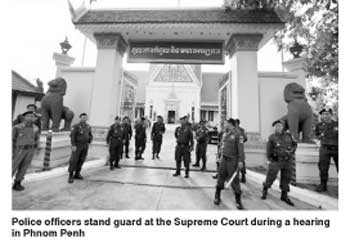Tuesday Feb 17, 2026
Tuesday Feb 17, 2026
Saturday, 18 November 2017 00:00 - - {{hitsCtrl.values.hits}}
 PHNOM PENH (Reuters): Cambodia’s government faced international criticism on Friday after the main opposition party was dissolved ahead of elections and the European Union raised a potential threat to vital trade preferences.
PHNOM PENH (Reuters): Cambodia’s government faced international criticism on Friday after the main opposition party was dissolved ahead of elections and the European Union raised a potential threat to vital trade preferences.
The Cambodia National Rescue Party (CNRP) was dissolved on Thursday by the Supreme Court at the request of the government of Prime Minister Hun Sen, whose rule of more than three decades was under threat at next year’s general election.
The CNRP leader, Kem Sokha, was arrested for treason on Sept. 3, charged with planning to take power with American assistance.
Hun Sen’s critics called the dissolution of the CNRP an attempt to steal the election and the death knell for democracy in a country where Western donors have spent billions of dollars since 1993 trying to build a multiparty system after decades of war.
“An electoral process from which the main opposition party has been arbitrarily excluded is not legitimate,” a statement from a European Union spokesperson said. “Respect of fundamental human rights is a prerequisite for Cambodia to continue to benefit from the EU’s preferential Everything But Arms scheme.”
That scheme giving tariff free access – and similar trade preferences in the United States – have helped Cambodia build a garment industry on low cost labour. Between them, EU and US markets take some 60 percent of Cambodia’s exports.
The US State Department did not respond to a request for comment.
US Republican Senator John McCain said the dissolution of the CNRP meant there was “no way the elections scheduled for 2018 can proceed in a manner that is free or fair” and called on US President Donald Trump to impose sanctions on Cambodia.
“The Trump administration should move quickly to sanction all senior Cambodian government officials responsible for violating human rights and subverting freedom in Cambodia,” he said in a statement. Australia said it was deeply concerned about the dissolution of the CNRP and a five-year political ban on 118 of its members. The United Nations said it was up to the Cambodian government to provide a free environment without fear for fair elections.
So far Western countries have shown little appetite for sanctions and the opposition itself has shied away from calling for steps to restrict garment exports because of the hundreds of thousands of workers who depend on them.
But leaders of the CNRP now say they support some sanctions.
“Sanctions are the best leverage for negotiation for free, fair and inclusive elections,” said Mu Sochua, a deputy to CNRP leader Kem Sokha who fled Cambodia fearing arrest.
The government has dismissed threats of international action and has the support of China, the biggest aid donor and investor in Cambodia.
In a televised address on Thursday, Hun Sen told Cambodians the election would go ahead “as normal” and appealed to politicians from the CNRP who had not been banned to join his Cambodian People’s Party (CPP).
There was no immediate government response to the EU statement and other foreign criticism.
US-based campaign group Human Rights Watch said the court ruling should lead Cambodia’s donors and trade partners to impose targeted sanctions, including asset freezes and travel bans on Hun Sen’s inner circle.
“The European Union, Japan, and other donors should immediately suspend all financial and technical election assistance for the 2018 elections unless the CNRP is fully reinstated and permitted to compete,” it said.